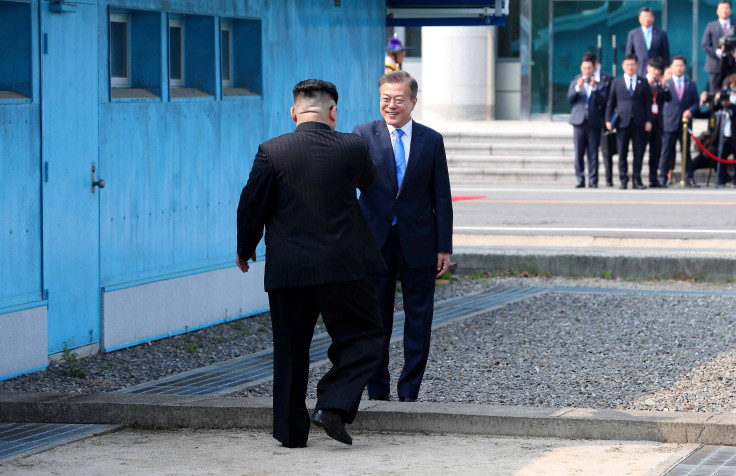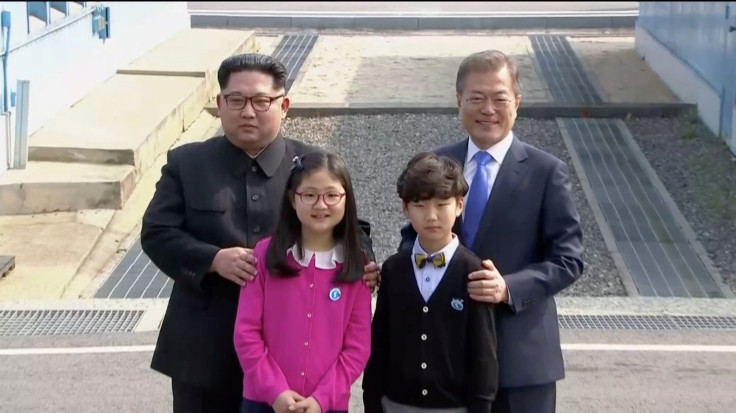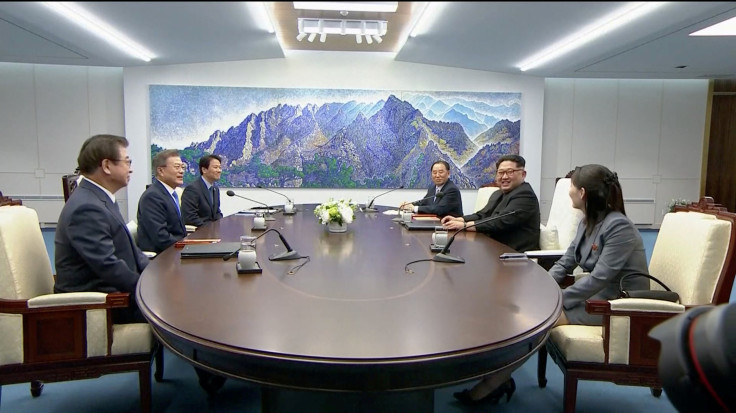'A New History Starts Now' As Leaders Of Two Koreas Begin Summit

Smiling and holding hands, North Korean leader Kim Jong Un and SouthKorean President Moon Jae-in met at the heavily fortified demilitarized zone between the countries on Friday in the first summit for the two Koreas in over a decade.
Scenes of Moon and Kim joking and walking together marked a striking contrast to last year's barrage of North Korean missile tests and its largest ever nuclear test that led to sweeping international sanctions and fears of a fresh conflict on the Korean peninsula.
The dramatic meeting, aimed at ending their decades-long conflict, comes weeks before Kim is due to meet U.S. President Donald Trump.
"We are at a starting line today, where a new history of peace, prosperity and inter-Korean relations is being written," Kim said before the two Korean leaders and their top aides began talks.
Moon and Kim are expected to discuss denuclearization and exchanges between the Koreas and also will plant a memorial tree at the border truce village of Panmunjom.
Just days before the summit, Kim said North Korea would suspend nuclear and long-range missile tests and dismantle its only known nuclear test site.
But there is widespread scepticism about whether Kim is ready to abandon the hard-earned nuclear arsenal his country has defended and developed for decades as what it says is a necessary deterrent against U.S. invasion.
Two earlier summits between the leaders of North and South Korea, in Pyongyang in 2000 and 2007, failed to halt the North's weapons programs or improve relations in a lasting way.
"Today, rather than create results we won't be able to carry out like in the past, we should make good results by talking frankly about current issues, issues of interest," Kim said.
FIRST ACROSS THE LINE
Moon greeted Kim at the military demarcation line, making Kim the first North Korean leader to set foot in the South since the 1950-53 Korean War.
In an unplanned move, Kim invited Moon to step briefly across into North Korea, before the two leaders crossed back into South Korea holding hands.
The two were handed flowers by a South Korean children, residents of a village situated in the demilitarized zone.

The pair were met on a red carpet by a South Korean honor guard in historical costumes and playing traditional music.
Kim wore glasses and his trademark black Mao suit, while the rest of the North Korean delegation appeared in military uniforms or Western attire.
"A new history starts now. An age of peace, from the starting point of history," Kim wrote inKorean in a guest book in the South's Peace House before talks began.
"I hope we will be able to talk frankly and come to an agreement to give a big present for theKoreans and the people around the world who wish for peace," Moon said as the two began their official talks.
Minutes before Kim entered Peace House, a North Korean security team conducted a sweep for explosives and listening devices, and sprayed apparent disinfectant in the air, on the chairs, and on the guest book.
The United States is hopeful talks between Kim and Moon will make progress on achieving peace and prosperity, the White House said in a statement as the two men began their summit.

The White House also said it looks forward to continuing discussions with South Korea in preparation for the planned meeting of Trump and Kim in the coming weeks.
Just months ago, Trump and Kim were trading threats and insults as the North made rapid advances in pursuit of nuclear-armed missiles capable of hitting the United States.
Earlier Friday, North Korea's official KCNA news agency said Kim would "open-heartedly discuss with Moon Jae-in all the issues arising in improving inter-Korean relations and achieving peace, prosperity and reunification of the Korean peninsula."
Moon traveled to the meeting in a large motorcade, stopping briefly to greet dozens of summit supporters waving South Korean flags near the presidential Blue House in Seoul.
Hundreds of demonstrators were seen gathering in downtown Seoul from early morning to protest or support the summit.
UNENDING HOSTILITIES
The two countries expect to release a joint statement late on Friday - possibly called the Panmunjom Declaration - that could address denuclearization and peace, and an improvement in relations, South Korean officials said.
Impoverished North Korea and the rich, democratic South are technically still at war because theKorean War ended in a truce, not a peace treaty.
The United States stations 28,500 troops in South Korea as a legacy of the Cold War conflict, which pitted the South, the United States and United Nations forces against the communist North, backed by China and Russia.
Kim and Trump are expected to meet in late May or June, with Trump saying on Thursday he was considering several possible dates and venues.
The White House released two photographs of then Secretary of State-designate and CIA chief Mike Pompeo's meeting with Kim in North Korea over the Easter weekend to discuss the planned summit. It was Kim's first known meeting with a U.S. official.
The latest Korean summit has particular significance not least because of its venue: the Demilitarised Zone, a 160-mile (260-km) long, 2.5-mile (4-km) wide strip of land created in the 1953 armistice to serve as a buffer between the South and North.
© Copyright Thomson Reuters 2024. All rights reserved.











